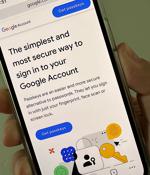Security News

Google on Wednesday announced that it's making available passkeys for high-risk users to enroll in its Advanced Protection Program. Based on the FIDO Authentication standard, the technology is designed to secure online accounts against potential takeover attacks by ditching passwords in favor of biometrics or a PIN. Passkeys can simultaneously act as a first- and second-factor, entirely obviating the need for a password.

Google announced today that passkeys are now available for high-risk users when enrolling in the Advanced Protection Program, which provides the strongest level of account security. The Advanced Protection Program is a free service that protects the accounts of users such as activists, journalists, business leaders, and political teams, who are at a higher risk of being targeted by online attacks.

Passwordless auth methods also lower support costs by eliminating password reset requests and scales easily with a growing user base, while also minimizing internal threats related to password misuse. While passwordless authentication methods like passkeys are simple on the surface for end users, there can be a lot of complexity under-the-hood for developers to handle when they're implementing passkeys.

As announced last October, the internet company reminds us that 'root' AWS accounts must enable MFA by the end of July 2024. Passkeys on AWS. FIDO2 passkeys are physical or software-based authentication solutions that leverage public key cryptography to sign a challenge sent by the server used for verifying the authentication attempt.

Google on Thursday announced that passkeys are being used by over 400 million Google accounts, authenticating users more than 1 billion times over the past two years. "Passkeys are easy to use and...

Your profile can be used to present content that appears more relevant based on your possible interests, such as by adapting the order in which content is shown to you, so that it is even easier for you to find content that matches your interests. Content presented to you on this service can be based on your content personalisation profiles, which can reflect your activity on this or other services, possible interests and personal aspects.

The Australian government announced in 2023 that it would phase out the use of passwords to access key government digital service platform myGov. In the first half of 2024, Australians may be asked to adopt passkeys, which use individual biometric data to authenticate users. The myGov passkey push across the Australian population will pave the way for IT leaders to adopt this more secure form of authentication in the private sector as public awareness and education rise.

X, formerly Twitter, announced today that iOS users in the United States can now log into their accounts using passkeys. The passkeys will be linked to the iOS device they're generated on and will significantly reduce the risk of breaches by providing protection against phishing attacks and blocking unauthorized access attempts.

At 1Password, we created and manage a passkeys directory, which keeps a running list of which websites, apps, and services offer signing in with passkeys, as well as an interactive element where users can vote for the businesses they want to see rollout passkey support-a useful resource to track ongoing adoption. Trusted developer tools that make it easy to implement passkey authentication into websites, apps, and services as logins will also be critical in getting more businesses to come around to passkeys.

How to Enable Passkeys For Your Google Account Enable passkeys today for fast and secure access to your Google accounts. You may add a passkey for any personal Google account, but you'll need to wait until an administrator allows passkey access for any Google Workspace accounts.